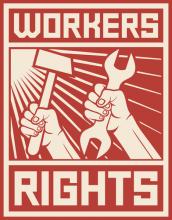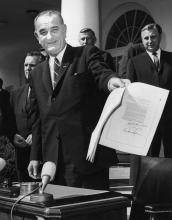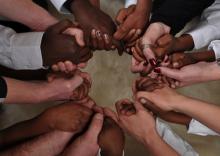Economic Justice

The House Wednesday overwhelmingly passed a bill to allow places of worship to receive federal aid to repair their buildings damaged during Hurricane Sandy.
The bill, which garnered strong bipartisan support, is also expected to pass the Senate, and would address what its sponsors consider a discriminatory practice that keeps federal disaster money from religious groups.
Currently the Federal Emergency Management Agency excludes religious organizations but assists privately owned nonprofits. If the bill becomes law, it will make houses of worship eligible for relief on the same terms as other nonprofits.
“Today’s debate and vote is about those who are being unfairly left out and left behind,” Christopher Smith, R-N.J., one of the bill’s lead sponsors, told his House colleagues.
“It’s about those who helped feed, comfort, clothe, and shelter tens of thousands of victims now being told they are ineligible for a FEMA grant.”

I’m a senior. And I’m mad. In fact, I am resigning from the AARP.
The America Association of Retired People has about 38 million members and is one of the biggest, most influential lobbies in Washington. It has done many good things for older Americans, but in some important ways it is just plain wrong — selfish and guilty of intergenerational injustice.
As Fareed Zakaria pointed out is a 2011 column in Time, the federal government spends about $4 on every senior over 65 and only $1 on every child under 18. “That is a statement about our priorities,” Zakaria rightly says, “favoring consumption over investment, the present over the future, ourselves over our children.” Partly as a result the poverty rate for children (22 percent) is much higher than that for seniors (9.7 percent).

WITH A ONE-TWO punch, 2012 was bracketed by the speedy and unexpected adoption of so-called "right-to-work" laws to undermine labor unions in two Midwestern states—Indiana and Michigan. That was preceded in 2011 by other bad news for labor: frontal assaults on public employee unions in Wisconsin and in Ohio. The assault in Wisconsin succeeded despite the political firestorm it generated, but Ohio voters overrode the efforts of their governor and legislators to gut public-employee bargaining rights.
Yes, the labor wars are on full force in the Midwest—and they are challenging faith communities to dig back into their teachings about the dignity of work, the rights of workers, and the pursuit of justice.
Bishop Thomas Gumbleton, retired auxiliary bishop of the Catholic archdiocese of Detroit, minced no words in his article for the Kalamazoo Gazette in mid-December. "Right-to-work laws go against everything we believe," he wrote. "At the core of Christianity, Judaism, Islam, and all great religions are the values of dignity and respect, values from which economic justice and the right to organize can never be separated."
The phrase "right to work" sounds noble, but these laws are not about guaranteeing anyone meaningful employment. Instead, they prohibit union contracts with employers from requiring non-union employees—who benefit from the union's work negotiating wages and benefits—to pay dues in recognition of that fact.

There are two personality flaws that I consider to be more or less fatal: being cheap and being unkind to the wait staff.
By “cheap,” I don’t mean frugal. I’m talking about the kind of economic stinginess that goes far beyond being a good steward of your budget and resources. Cheap is miserly, selfish, and, I believe, based in fear. And nothing good is wrought when fear is your motivation.
Another word to describe this kind of cheap is more commonly employed in British English than in our own American lexicon: “mean.” Meanness connotes the habit of being ungenerous and petty.
This meanness is what the first fatal flaw and the second have in common. If you are rude, condescending, or just plain nasty to your server in a restaurant, it is, in the immortal words of Liz Lemon who crossed over last week into the eternity of syndication, a deal breaker.
The only thing worse than being cheap and nasty to the wait staff is invoking your religious beliefs to justify your actions. And that is, sadly, precisely what one pastor did when she attempted to stiff her waitress after church one recent Sunday night at a Missouri Applebee’s.
On Jan. 25, Alois Bell, pastor of the tiny Word Deliverance Ministries church in St. Louis, headed to the local Applebee’s with nine of her congregants – four other adults and five children – for a post-worship dinner. When the unidentified server returned with the bill for $39.43 at the end of the meal, Bell crossed out the automatic 18 percent gratuity (added to parties of six or more), wrote in the tip amount of “0” and the following handwritten message: “I give God 10%, why do you get 18?” Then she signed the credit card receipt “Pastor Alois Bell.”

I received a galimoto for Christmas. In case you didn't know, a galimoto is a toy vehicle created out of sticks, cornstalks, wire or anything children can take into their hands and make into a thing with wheels. Mine is a bicycle made of wire. There is a wire child in colorful cloth on the bicycle seat, a rider whose legs pedal as the wheels move. It is beautiful in its simplicity, astonishing in its complexity. It came from the hands of a child in Kenya. I love it.
I brought my galimoto to school and introduced it to my third-grade students. They held it in their hands, marveled at its design, and pushed it around the classroom. "A kid made this?" Matthew asked. "Amazing!"
We looked at a globe and located South Carolina and Kenya. We flew with our fingers from Greenville across the Atlantic Ocean across Africa to Nairobi. We wondered what it would be like to live there. What would the weather be like? What foods would we eat? What kind of house would we live in? What clothes would we wear? What would our school be like? What would our parents do? What would we play with? "I know what we would play with," said Syleana with a smile. "A galimoto!"
We took a picture walk through the book Galimoto written by Karen Lynn Williams and illustrated by Catherine Stock. "What do you notice when you look at the cover of the book?" I asked.
"It looks like the little boy is poor," answered Zaniya.
"Why do you think he's poor?" I continued.

Annie Lowrey's recent New York Times magazine article "Washington's Economic Boom, Financed by You" provides a stimulating look into Washington, D.C.'s "economic boom" of the last few years. As D.C. residents, many of us encounter the ongoing transformation of our city every day. We know the area's economy has grown about three times as much since 2007 as the country — largely a result of expanded government spending (primarily in the form of two foreign wars). We also know that the greater metropolitan region is one of the richest in the country. As Lowrey noted, the Washington metro area has seven out of the top 10 highest-income counties in the U.S., including the three highest.
However, Lowrey only tells one side of the story — the rich side. The "economic boom" has largely passed by D.C.'s poor and working people. By not mentioning D.C.'s grossly high poverty rates, the article is misleading.
Amid Washington's economic boom, there is also massive economic displacement, increased economic inequality, and higher rates of poverty.
Economist Joseph Stiglitz contends that the growing inequality in the U.S. makes an economic recovery more difficult and is leading to the death of the American dream.
“Politicians typically talk about rising inequality and the sluggish recovery as separate phenomena, when they are in fact intertwined. Inequality stifles, restrains and holds back our growth. When even the free-market-oriented magazine The Economist argues — as it did in a special feature in October — that the magnitude and nature of the country’s inequality represent a serious threat to America, we should know that something has gone horribly wrong. And yet, after four decades of widening inequality and the greatest economic downturn since the Depression, we haven’t done anything about it.”
New reports this afternoon are that House Republicans have agreed to vote next week on extending the debt ceiling for about three months, giving time for passage of a budget. The agreement would not require immediate spending cuts, a retreat from the previous GOP position. Democrats so far have responded cautiously to the plan for a short-term increase.
According to the Washington Post:
“House Republicans will scale back their ambitions in an upcoming fight over the nation’s borrowing limit, saying Friday that they will try to pass a bill next week to raise the debt ceiling for three months. But they indicated that the Senate must pass a budget before the lawmakers would agree to a longer-term increase in the limit.
“Under a bill to be considered next week, members will propose raising the debt ceiling through mid-April -- long enough, they say, to give both chambers time to pass a budget. Under the measure, if either chamber fails to adopt a budget by April 15, Congress would not be paid.”

I was a nervous kid. Once, I got so freaked out by the prospect of a speaking part in my first-grade school play that my folks thought I had come down with appendicitis. But there were two times in particular that I remember descending into unmitigated panic. Both involved discussions with my dad about my career.
The first time, my dad was telling me about his year-by-year earning trends as an insurance salesman. He went from being one of several agents manning a booth in a Sears store to being the highest-earning employee in his major international company over about 15 years. He added zeroes to his income, and a passel of staffers, including my mom for a while (didn’t work out so well – they divorced thereafter).
At his height, he was earning upwards of half a million a year, and this was in the 80s. His company flew him all over the world, showered him with awards, and held him up as the high-water mark for all other agents to aspire to. I combined this remarkable achievement with the implicit cultural message that all generations exceeded their parents in earning power and went into an emotional tailspin.
How in the hell was I going to make that kind of money?

For the past two years, Sojourners has been in the middle of every budget battle speaking out on behalf of poor and struggling families and individuals. With your help and support, we made news across the country by asking, “What Would Jesus Cut?” More than 30,000 people joined Jim Wallis in a fast for a moral budget. We’ve run print, radio, and TV ads.
But, this work isn’t over. We need to prepare now.
That’s why Sojourners has teamed up with PICO, one of the nation’s largest community organizing networks, to create and distribute “The Choices We Face: A Guide for Faith Leaders to the Federal Budget and Tax Debate.”
At 14 years old, Sydia Simmons was kicked out into the streets of New York City by her alcoholic mother, but today she is a wife, mother, and founder of the Lost Angels Society.
The purpose of the Lost Angels Society is to provide a safe space for homeless teens. Sydia knows firsthand the difficulty of being homeless, especially in New York City, and because she has overcome through her faith she wants to give back.
On Dec. 16, 2012 Sydia hosted the Lost Angels Society Benefit to give homeless youth a Christmas celebration. This benefit was supported by actress Uma Thurman, superstar singer Usher, and many others.
Sydia truly has compassion and a passion for homeless youth, and an important message for the Church. Isaiah 61: 3-4 states: “They will be called oaks of righteousness, a planting of the Lord for the display of his splendor. They will rebuild the ancient ruins and restore the places long devastated; they will renew the ruined cities that have been devastated for generations.” Sydia truly fits the description above because she is rebuilding the lives of teens devastated by homelessness.
The Nation reports that the fiscal cliff deal is a "mixed bag" for the poor. On the positive side:
The biggest takeaway, perhaps, was for the unemployed: they saw a one-year extension in federal unemployment benefits. Another very important piece of the deal was a five-year extension of crucial tax breaks: the Earned Income Tax Credit, Child Tax Credit and the American Opportunity Tax Credit.
On the negative side:
The payroll tax holiday was allowed to expire. The double whammy of trying to get Congress to raise the debt ceiling while also trying to keep it from torching the social safety net does not bode well for the poor.
Read more here.

In The Last Shot, Frey has written a compassionate book. It is truly a compass that guides us into the sneakers and the hearts of children growing up in the housing projects of Coney Island, New York — inner-city kids defying the law of nature by growing in a tough place like flowers growing through concrete.
It is truly passionate about basketball and life, basketball as it is loved by children, coaches, and communities ... life as it is felt through the hearts of people who know human beings are human beings and not commodities.

When asked to identify common features of the historical Christmas storyline, many speak of Mary, Joseph, shepherds, wise men, angels, King Herod, and of course, the newborn Jesus. But we too often fail to recognize the social circumstances in which Jesus was born; our understanding of the nativity narrative is too often left incomplete.
In the midst of our various congregational and community Christmas celebrations, we are confronted with the harsh reality that Jesus was brought into the world within a condition of homelessness. As a result, one can argue that we cannot fully commemorate Christmas without recognizing its social setting, for the context of Jesus’ birth points us toward the content and concerns of Jesus’ life.

We have reached that point in the year when the images we are inundated with show off variations on a theme: the Norman Rockwell-esque holiday gathering. They are a testament to the ability of advertising to tug on our heartstrings as the large, joyful family sits down to a table lavishly set with the antique china, candles twinkling, and a feast spread as the Christmas meal in all its glory looms and the joy and generosity of the season is palpable.
Here in Florida, the grocery store chain Publix is as ubiquitous to holiday celebrations as pie. Publix has been a part of our Christmas celebrations for generations and yet this year impromptu runs to the family-owned grocer will simply not be an option for the Reverend Clay Thomas, or for those who stand with him.
As it turns out, earlier this year Reverend Thomas was ejected and then banned from a Sarasota, Fla., Publix.
His crime?
He supports the Coalition of Immokalee Workers (CIW).

“We firmly oppose organized efforts, such as those regrettably now seen in this country, to break existing unions and prevent workers for organizing.”
My brother bishops and I wrote that more than a quarter-century ago in our 1986 letter Economic Justice for All. Regrettably, it rings true still today.
The right-to-work legislation that was passed by the House and the Senate in Michigan just this month is designed to break unions. It is designed to prevent workers from organizing. And we must oppose it as firmly as we did during the 1980s.

I asked a small group of second-graders what they would like to find inside their mailboxes. That was after we read a story about a goose who opened her mailbox and found a kite. I expected to hear answers of things: video games, toys or basketballs. But the first student who raised her hand looked at me with sincere, big brown eyes and said, "I'd like to find a letter from my dad."
In my classroom, my kids say the profoundest things.
As we entered the holiday season, I thought about the answer that student gave me. I thought about what other of my 7-, 8- and 9-year-olds were saying about the holiday season.
For three years, I lived and worked in a large housing project in Louisville, Ky. I was a middle-class, white graduate student, and my background clouded how I saw the people around me. But I finally began to see clearly.
The Huffington Post reports:
A vigorous effort to house the homeless has been countered somewhat by a sluggish economy.
The federal government and local communities have greatly increased the number of beds available to the homeless over the last four years, either through emergency shelters or through government-subsidized apartments and houses. But the struggling economy contributed to the number of homeless people in the United States remaining stable between January 2011 and January 2012.
Read more here.

I had a conversation with a young woman I met at a conference recently. The conversation rocked me.
I represented the faith voice on a panel at a major secular conference for philanthropists. The panel focused on the question: “What are we not talking about?”
One of my colleagues focused on the nonprofit sector’s inability to make real just change in our world because they are bound by the interests of donors who are, themselves, part of the 1 percent. Another colleague focused on the glut of nonprofits offering similar services in otherwise abandoned communities. I focused on the need for social movements to bring about a more just world and the role of faith communities in those movements, in particular.

Joey Ekburg, Executive Director of the North Park Friendship Center, was never one to mince words. “We pay almost twice the amount for food, and we have more clients than ever before.” It took awhile for the words to sink in and the math to play out in my head. I was never great at math, but the implications were pretty obvious.
I looked over at the people sitting near the entrance, waiting to pick up food to make it through the week. I wondered what would happen if this food pantry were to run out of food or if the unthinkable were to happen — the Friendship Center suddenly shutting its doors.
The Albany Park neighborhood in Chicago has served as an entry point for generations of immigrant families, including my own. Many of them come to America looking for a fresh start. Sometimes that search becomes reduced to finding a fresh meal.